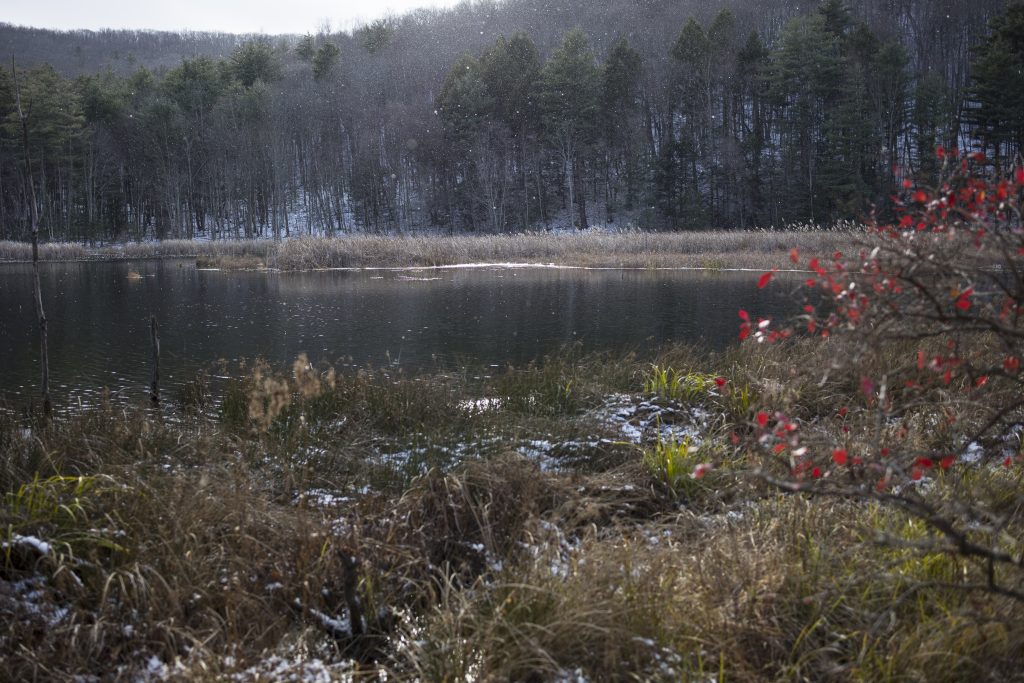Binghamton University received recognition for the second consecutive year in the 2020 Sustainable Campus Index by the Association for the Advancement of Sustainability in Higher Education (AASHE).
The University was deemed a top performer in the research subcategory, where it was compared to research at other doctoral institutions. Donald Nieman, provost and executive vice president for academic affairs, said he finds this recognition to be rewarding given the real-world application research at BU has.
“It is very gratifying because it underscores our strength in an area that is vitally important to the future of the planet and demonstrates that our research is having an important impact,” Nieman wrote in an email.
BU was awarded this recognition after AASHE measured the University’s sustainability in 17 distinct impact areas or facets of the University that can contribute to sustainability. Some of these impact areas include research, curriculum, campus engagement, air and climate, energy and waste when calculating a full report for an institution. The method of measurement used was the Sustainability Tracking, Assessment and Rating System (STARS), which is utilized by higher education institutions that aim to provide increased sustainability.
BU tied with Florida State University, The University of California (UC) Irvine, UC Merced and UC San Diego in this achievement. STARS looked at the ratio of total researchers to sustainability researchers at BU, the types of programs at BU that encourage sustainability research and the availability of scholarly journal articles to students at the University.
In addition to these initiatives, Nieman said there were several steps the University took to help BU to reach this achievement.
“I think that there are two things that contribute to our strength in the area,” Nieman wrote. “First, we have excellent faculty in many schools and departments who are conducting world-class research on sustainability. Second, as an institution, we have recognized the importance of this area through faculty hiring and also through investments in our sustainable communities transdisciplinary area of excellence, which has facilitated research collaboration that has made the whole greater than the sum of the parts.”
STARS rates institutions on a scale of five levels: Reporter, Bronze, Silver, Gold and Platinum. Reporter indicates a lower sustainability status, and Platinum is the highest rating of sustainability. BU received an overall Gold rating.
While this is a significant accomplishment for the University, Monika Urbanski, data and resources manager for AASHE, said any institution can improve sustainability efforts by participating in STARS.
“Nine out of 10 institutions using STARS [have] helped move or will help move the institution forward toward sustainability,” Urbanski wrote in an email. “Regular participation in STARS is one way to improve on sustainability.”
BU’s STARS score report is available for public viewing here. The STARS website states there are 601 researchers at BU located in 42 departments. Among these, 34 departments as well as 155 researchers are involved with sustainability research.
Student researchers at BU have been recruited to research for sustainability through various programs, such as the First-year Research Immersion program, the Source Project, summer research opportunities and upper-level research courses. Students in these programs pursuing this research explore different sustainability issues, such as invasive species and water pollution, deindustrialization and education, affordable housing and food security, as well as topics related to water, health and energy systems.
Allison Underhill, a sophomore double-majoring in human development and Spanish, said she thinks this recognition is beneficial in fostering a group of students aware of the need for sustainability, though she feels the University could do better in implementing more sustainable practices.
“I think that this is a good thing because we are breeding the emerging leaders of tomorrow, however, I think that the University should mirror these sustainable practices within our everyday lives to make it more official and promote it in a more cohesive and coherent way throughout all aspects of University life,” Underhill said. “For example, dining services — there is so much waste that could be prevented. The simple addition of composting and [having] reusable utensils as well as [reusable] takeout containers will be one of the ways to promote the sustainable practices into everyday life.”
Lindsey Sherwood, a sophomore majoring in biology, said she considers this recognition to be good for attracting future funding from potential donors.
“From a research perspective, it’s great because people are going to want to fund more money into [BU],” Sherwood said. “If you are a Ph.D. student looking for a sustainable practice, now people are going to want to come here, and that’s good for the University in the sense of the reputation.”
Nieman said he believes that the University will continue to foster sustainability in the upcoming future.
“We plan to continue to support faculty research and collaboration in sustainability research and also manage construction projects and campus operations in ways that reflect best practices in sustainability,” Nieman wrote.



